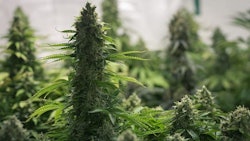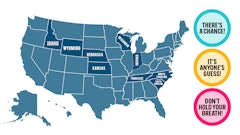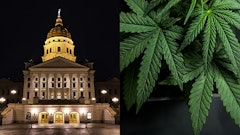
Medical cannabis legalization is back on the table in Kansas.
Senate Bill 560, the Medical Marijuana Regulation Act, was introduced March 11 in the Senate Federal and State Affairs Committee and is sponsored by Sen. Robert Olson, a Republican who serves as the vice chair of the committee.
The legislation seeks to regulate the cultivation, processing, distribution and sale of medical cannabis and includes more than 20 qualifying conditions for potential patients. Some of those conditions include Alzheimer’s disease, cancer, epilepsy, fibromyalgia, glaucoma, hepatitis C, multiple sclerosis, Parkinson’s disease, post-traumatic stress disorder, sickle cell anemia, Tourette’s syndrome and traumatic brain injury.
The reform effort comes two months after a House-passed medical cannabis bill stalled in the Senate, with leadership in the upper chamber canceling planned hearings on the legislation and re-referring it to another committee, The Kansas City Star reported.
Under the new bill, the smoking, combustion or vaporization of medical cannabis would be prohibited. According to S.B. 560’s text, the following forms of medical cannabis may be dispensed: oils, tinctures, plant material, edibles, patches, or any other form approved by the secretary of revenue. Plant material would have a 35% THC cap in its final dispensed form.
While the maximum supply that may be purchased by a patient or caregiver would be 3 ounces of dried flower or an equivalent in a 30-day period, there would be exceptions “from any such limitation upon submission of a written certification from two independent physicians that there are compelling reasons for the patient or caregiver to purchase greater quantities of medical marijuana,” according to the legislation.
Under current Kansas laws and penalties, possessing any amount of cannabis is a misdemeanor punishable by up to six months of incarceration and a max fine of $1,000, according to advocacy group NORML.
Kansas is one of 13 states remaining without medical cannabis legalization in the U.S. Democratic Gov. Laura Kelly has repeatedly voiced her support for a regulated program, according to advocacy group Marijuana Policy Project.
S.B. 560 aims to give state regulators until Jan. 1, 2024, to propose rules and regulations to administer a medical cannabis program, and implement and enforce the provisions of the legislation.





















